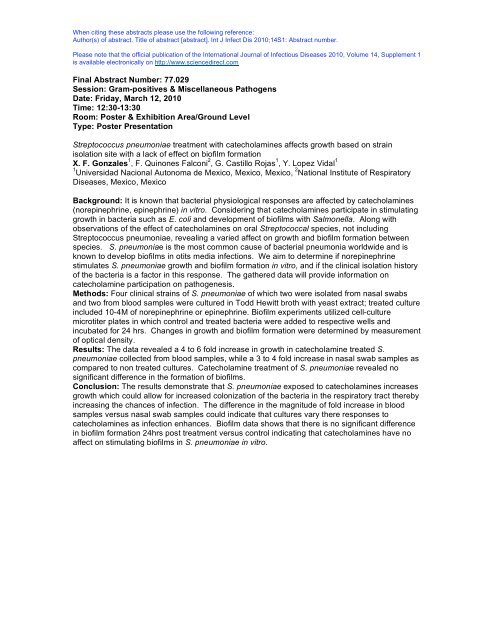14th ICID - Poster Abstracts - International Society for Infectious ...
14th ICID - Poster Abstracts - International Society for Infectious ...
14th ICID - Poster Abstracts - International Society for Infectious ...
Create successful ePaper yourself
Turn your PDF publications into a flip-book with our unique Google optimized e-Paper software.
When citing these abstracts please use the following reference:<br />
Author(s) of abstract. Title of abstract [abstract]. Int J Infect Dis 2010;14S1: Abstract number.<br />
Please note that the official publication of the <strong>International</strong> Journal of <strong>Infectious</strong> Diseases 2010, Volume 14, Supplement 1<br />
is available electronically on http://www.sciencedirect.com<br />
Final Abstract Number: 77.029<br />
Session: Gram-positives & Miscellaneous Pathogens<br />
Date: Friday, March 12, 2010<br />
Time: 12:30-13:30<br />
Room: <strong>Poster</strong> & Exhibition Area/Ground Level<br />
Type: <strong>Poster</strong> Presentation<br />
Streptococcus pneumoniae treatment with catecholamines affects growth based on strain<br />
isolation site with a lack of effect on biofilm <strong>for</strong>mation<br />
X. F. Gonzales 1 , F. Quinones Falconi 2 , G. Castillo Rojas 1 , Y. Lopez Vidal 1<br />
1 Universidad Nacional Autonoma de Mexico, Mexico, Mexico, 2 National Institute of Respiratory<br />
Diseases, Mexico, Mexico<br />
Background: It is known that bacterial physiological responses are affected by catecholamines<br />
(norepinephrine, epinephrine) in vitro. Considering that catecholamines participate in stimulating<br />
growth in bacteria such as E. coli and development of biofilms with Salmonella. Along with<br />
observations of the effect of catecholamines on oral Streptococcal species, not including<br />
Streptococcus pneumoniae, revealing a varied affect on growth and biofilm <strong>for</strong>mation between<br />
species. S. pneumoniae is the most common cause of bacterial pneumonia worldwide and is<br />
known to develop biofilms in otits media infections. We aim to determine if norepinephrine<br />
stimulates S. pneumoniae growth and biofilm <strong>for</strong>mation in vitro, and if the clinical isolation history<br />
of the bacteria is a factor in this response. The gathered data will provide in<strong>for</strong>mation on<br />
catecholamine participation on pathogenesis.<br />
Methods: Four clinical strains of S. pneumoniae of which two were isolated from nasal swabs<br />
and two from blood samples were cultured in Todd Hewitt broth with yeast extract; treated culture<br />
included 10-4M of norepinephrine or epinephrine. Biofilm experiments utilized cell-culture<br />
microtiter plates in which control and treated bacteria were added to respective wells and<br />
incubated <strong>for</strong> 24 hrs. Changes in growth and biofilm <strong>for</strong>mation were determined by measurement<br />
of optical density.<br />
Results: The data revealed a 4 to 6 fold increase in growth in catecholamine treated S.<br />
pneumoniae collected from blood samples, while a 3 to 4 fold increase in nasal swab samples as<br />
compared to non treated cultures. Catecholamine treatment of S. pneumoniae revealed no<br />
significant difference in the <strong>for</strong>mation of biofilms.<br />
Conclusion: The results demonstrate that S. pneumoniae exposed to catecholamines increases<br />
growth which could allow <strong>for</strong> increased colonization of the bacteria in the respiratory tract thereby<br />
increasing the chances of infection. The difference in the magnitude of fold increase in blood<br />
samples versus nasal swab samples could indicate that cultures vary there responses to<br />
catecholamines as infection enhances. Biofilm data shows that there is no significant difference<br />
in biofilm <strong>for</strong>mation 24hrs post treatment versus control indicating that catecholamines have no<br />
affect on stimulating biofilms in S. pneumoniae in vitro.
















